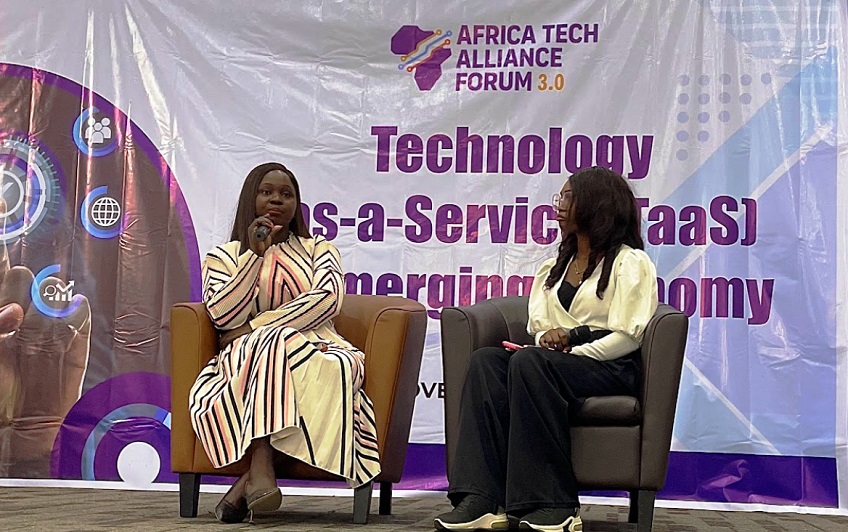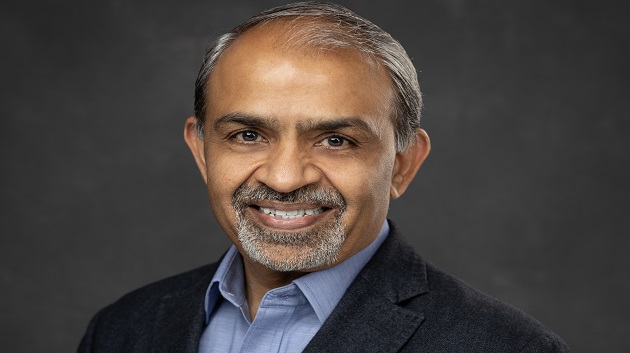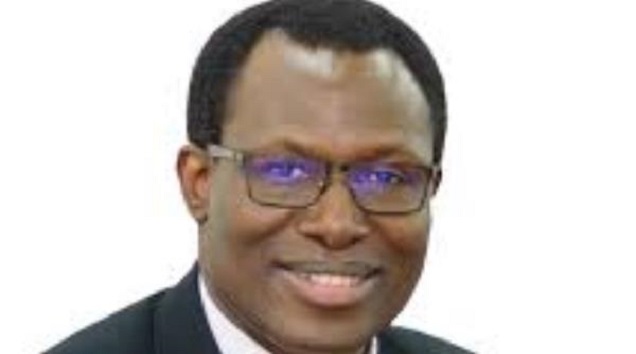Telecom
AfriTECH 3.0: Digital Encode Hints How Emerging Techs Drive Cyber Trends

Digital Encode, a leading consulting and integration firm has said that in its 20 years of existence, it has been able to certify so many organisations with different kinds of certifications, ranging from high school certifications to carrying out payment card industry (PCI) data security standards (DSS) for companies within and outside Nigeria.

Digital Encode, which prides itself as the number one information technology assurance company in Africa, specializes in the design, management and security of business-critical networks, telecommunications environments and other information technology infrastructures.
Speaking during a Fireside chat with Joan Aimengheuwa, a senior Content writer with TechEconomy, at the Africa Tech Alliance (AfriTECH 3.0) Forum held at The Providence Hotel, Ikeja GRA, Olaifa Opeyemi, a Cybersecurity Consultant at Digital Encode Limited said the company known for solving multifaceted, complex enterprise network security and audit problems, will keep on working tirelessly to remain ready for the ever-evolving digital skills.
Responding to a question on cybersecurity trends in Africa, Opeyemi said there has really been an increase in cyber trends owing to sustained advancement in the digital space, emerging technologies, and the increasing emergence of new smart devices.
“There was a time of web applications. Now, it’s time for mobile applications. The more technology you introduce, the more trends you introduce out there. And then the more there are some bad people; they are trying to see how they can exploit that technology you put out there. So, there has been an increase in cybersecurity trends, ranging from ransomware to malware to other forms of attacks, business logic attacks, and all those kinds of trends that they could use or exploit.
“Even in social engineering, there is phishing, which has become very rampant. Aside from trends, there has also been an increase in this old cryptocurrency attack, which they often refer to as the crypto champion. Even though cryptocurrency has been in existence for quite a while, it became much known a few years back. So, these bad guys out there are already going to devise something called the crypto champion.
“Crypto champion is a tool that they use to first try to get access to your device. Then once they have access to your device, they install this particular solution and have you actually mine your cryptocurrency. And then you get the money from your cryptocurrency without your knowledge,” Opeyemi said.
On the positive developments in cybersecurity, she said that there has been an increase in data protection efforts in Nigeria, since the enforcement into law of the data protection bill by President Bola Tinubu, adding that in 2020 and 2021, South Africa and Egypt incorporated the PRP Highway, which is the protection of personal information. “Over the years, different countries in Africa have really been trying to enforce this data protection,” she further added.
Opeyemi stressed that security is not just about the company, but also about the staff in an organisation as well, noting that “if you have the technology, and you have your people aligned, whether it comes to security, you also need process policies to govern them. Policies in terms of making a change in the environment, making sure you make the change request.
“Before you create a password, make sure you follow the password policy. Before you do this, make sure you do that. So really, there are a lot of tracks there; – Ransomware, malware, social engineering, and even distributed denial of service. When it gets like this, there’s enough traffic, and they put down a service in the organisation.”
“Cybersecurity is really just about being there, the confidentiality of information, the integrity of information, and the availability of that information. Confidentiality of information is just that you have to ensure that you’re protecting whatever information you have for unauthorized access, which is what we want to ensure with cybersecurity.
“On Integrity, you’re protecting that information from unauthorized deportation. You don’t want someone who’s not supposed to have access to that file to have access. And on availability, if you’re a sponsor, you’re trying to make sure that your services are available to you. You don’t want things to ever be disrupted or hit anywhere,” Opeyemi further stated.
On how companies can protect their data, the cybersecurity consultant warned that in a case like DDoS, companies should insist on an application or network because of the heavy traffic associated with this kind of cybercrime, advising that there would be the need for traffic imagery.
“First, you need to have what I call traffic imagery. There are so many solutions out there that you can actually use in your organization, and it will help you to filter this traffic. So as traffic is coming to the system, whether it’s a system or an application, it helps to filter that suspicious traffic. And all these devices are actually, to some extent, smart.
“They see the traffic from a certain source, and then when they see such traffic, they don’t get suspicious. But then when they are seeing traffic from a source that they are not very used to, they will most likely rate it as suspicious, which is why sometimes when you now do your review, you find out that it’s not reading anything,” she said.
Opeyemi implored the government to intensify efforts at creating awareness on the need for cybersecurity consciousness and not just limiting itself to regulatory oversight and standardization, noting that creating cybersecurity awareness from the primary school level would go a long way to building a cybercrime-free nation.
Telecom
WhatsApp to Start Showing more Adverts in Messaging App

WhatsApp is launching three new ad features in a global roll-out across the messaging app.

The Meta-owned platform said the new ads will not be shown in the same place as people’s private chats, nor will the contents of their messages – which are encrypted – be used to decide which ads to display.
WhatsApp will instead use the country, city and language of the user, as well as how they interact with other ads and which channels they follow, to drive suggested content.
But people who have chosen to link their WhatsApp account to Facebook or Instagram will see more personalised ads.
The new ad features will appear in a section called Updates, which is a separate tab at the bottom of the app.
WhatsApp claims to have 1.5 billion users globally.
Businesses with channels will be able to choose to promote ads in the Updates section to attract new followers, and also charge a subscription to access extra content.
WhatsApp will eventually take a 10% commission of that fee, and there may also be extra costs on top of that taken at the app store level depending on the size of the business.
Firms will also be able to advertise in the form of a status update, which looks similar to an Instagram story and will link through to start a chat if clicked on.
Social media expert Matt Navarra told reporter that Meta is “laying the foundation for WhatsApp to finally become a monetisable platform at scale”.
But “monetising the periphery” of WhatsApp, while keeping personal chats private, would not be without risk for the company, he added.
This could particularly be the case in markets like the UK and Europe, he said, where the app is viewed primarily as a messaging tool with less appetite for content feeds or adverts.
“Any perception that the app is becoming noisy or Facebook-ified will spark backlash,” he said.
How does WhatsApp make money?
‘Natural extension’
It’s no coincidence that the new features bring WhatsApp more in line with Meta’s other platforms Facebook and Instagram.
“Obviously there’s overlap,” said WhatsApp boss Will Cathcart.
“We have stories on Instagram and stories on WhatsApp, and we now have a way for businesses to promote themselves in both, and we think that’s a good thing.”
He said he believed the move was a “natural extension of messaging services” and not dissimilar to features of rival apps such as Snapchat and Telegram.
For Mr Navarra, it also reflects a wider shift in the social media landscape.
“The feed is dying, public sharing is down, people are retreating into DMs and Stories in small groups,” he said.
“Meta’s trying to turn WhatsApp into a platform without users realising it and if they move too fast or it starts to feel like another ad network, people might disengage or maybe worse, distrust the app.”
Telecom
Airtel Africa Reinforces Commitment to ESG Impact while Advancing Digital, Financial Inclusion Across 14 Markets

Airtel Africa, a provider of telecommunications and mobile money services across 14 African countries, has published its Sustainability Report 2025, reaffirming its corporate purpose of transforming lives by expanding access to essential digital services, supporting inclusive economic growth, and advancing environmental stewardship throughout its operations.

In 2024/25, Airtel Africa made significant progress in bridging the digital divide, advancing financial inclusion and supporting underserved communities through strategic investment in connectivity, people, and sustainable practices.
Airtel Africa’s chief executive officer Sunil Taldar said: “This year’s achievements, from connecting 2,176 schools through the UNICEF partnership to reaching 44.6 million Airtel Money customers with near-gender parity, prove that the power of technology is a catalyst for gender balance. At Airtel Africa, we believe to not only expanding networks but we’re also building bridges to education, financial security and sustainable growth for Africa’s next generation.”
Key ESG highlights:
- Providing underserved communities with access to reliable network and connectivity:
- 2% population coverage across 14 markets (up from 80.4% in 2023/24)
- 36,159 4G infrastructure sites, including more than 15,300 in rural areas.
- Continued investment of $670m in network expansion and modernisation to boost speed, coverage and capacity.
Airtel Africa is connecting the unconnected, giving millions access to voice, data and mobile money services – driving economic opportunity and enhancing access to essential services.
- Bridging the digital divide, driving financial inclusion and addressing gender inequality
- 4 million data customers (+14.1% vs 2023/24)
- 6 million Airtel Money customers (+17.3%), with 44.2% Airtel Money customers who are women (+6.2% vs 2023/24)
- 7 million Airtel Money agents in our distribution network (+23.4% vs 2023/24)
- 2% women in the workforce across the Group (up from 28.3% vs 2023/24)
Through inclusive digital services and affordable financial products, Airtel Africa is empowering individuals and communities, particularly women, to fully participate in the digital economy.
- Unlocking potential through education and employment opportunities
- 2,176 schools connected to the internet free of charge (up from 1,201 in 2023/24)
By providing free connectivity and online resources to schools, Airtel Africa is helping young people reach their full potential. A growing agent network also supports employment and entrepreneurship opportunities across its footprint.
- Minimising the impact of our operations on the environment
- 500 off-grid sites converted to on-grid power, reducing reliance on diesel generators.
- 93% of total waste recycled (+3% vs 2023/24)
Airtel Africa is committed to reducing the impact of its operations on the environment through investment in renewable energy solutions and responsible waste management.
The Sustainability Report 2025 adheres to the Global Reporting Initiative (GRI) and GSMA telecommunications industry standards.
Telecom
ALTON Clarifies on Migration to End-User Billing for USSD Services

The Association of Licensed Telecom Operators of Nigeria (ALTON) wishes to inform the public and all mobile subscribers that the migration to the End-User Billing (EUB) model for Unstructured Supplementary Service Data (USSD) services will take effect from Wednesday, 18th June 2025.

This transition marks a significant milestone in the evolution of Nigeria’s digital financial ecosystem and is being implemented per the Determination of USSD Pricing and Services issued by the Nigerian Communications Commission (NCC).
The Determination was developed in collaboration with the Central Bank of Nigeria (CBN) and other key stakeholders to ensure a sustainable, transparent, and customer-friendly framework for USSD service delivery.
USSD services play a vital role in expanding access to financial services, particularly for unbanked and underbanked populations. However, the previous corporate billing model—where banks were billed by telecom operators—led to prolonged disputes over unpaid charges, service interruptions, and uncertainty for customers.
To address these challenges, the NCC’s 2025 Determination introduced the End-User Billing model, which allows mobile network operators to charge customers directly for USSD sessions.
To achieve the implementation of the EUB model, the CBN and NCC have stipulated that only banks that meet certain regulatory and operational conditions are permitted to migrate. One of which is the notification to customers of the billing change in advance, and to ensure that customers are fully aware of the new airtime-based charges and how they will be applied.
Accordingly, under the new billing model, USSD charges will be deducted directly from the customer’s airtime balance, not from their bank account, and each USSD session will attract a charge of ₦6.98 per 120 seconds. To enjoy the service, customers will receive a prompt to opt in and approve the charge before any deduction is made, and there will be no double billing as billing will only occur for successful sessions via airtime deductions.
ALTON wishes to reiterate that this change does not affect the availability or functionality of USSD banking services, as customers can continue to use their bank’s USSD codes as usual, provided they have sufficient airtime.
To ensure a smooth transition, ALTON advises customers to follow these support guidelines:
–For access issues (e.g., inability to dial USSD codes), contact your mobile network operator.
– For transaction-related issues (e.g., failed transfers or service errors), contact your bank’s customer service.
– Both banks and mobile network operators are required to provide responsive support and mensure that customers can access and use USSD services without disruption.
Alternative digital banking channels such as mobile apps, internet banking, and ATMs remain fully operational and available for customer convenience.
ALTON reiterates its commitment to working closely with the NCC, CBN, financial institutions, and other stakeholders to ensure that this transition is seamless, equitable, and beneficial to all parties, especially the end users.
We remain dedicated to promoting transparency, operational efficiency, and consumer protection across Nigeria’s telecommunications and digital finance sectors.

 News3 days ago
News3 days agoWhy I am vying for AFRINIC board seat in 2025 election – Terry Edet

 Telecom2 days ago
Telecom2 days agoGSMA, Mobile Industry Call for Strengthened Action to Advance Child Online Protection in Africa

 E-Financial3 days ago
E-Financial3 days agoFidelity Bank ED, Kevin Ugwuoke takes over as President of Risk Managers Association

 Telecom3 days ago
Telecom3 days agoCrypto Exchange MEXC Rolls Out P2P Support for Naira, Birr, and Rupee

 Telecom24 hours ago
Telecom24 hours agoALTON Clarifies on Migration to End-User Billing for USSD Services

 News2 days ago
News2 days agoDigital Africa Global Consult, NDPC Partner on Ground-Breaking “Nigeria Data Challenge” Initiative

 General News2 days ago
General News2 days agoTD Africa, HP Strengthen Partnership to Advance Africa’s Tech Ecosystem

 General News3 days ago
General News3 days agoAirtel Concludes Nationwide Environment Week with Market Clean-Up by Employees



























